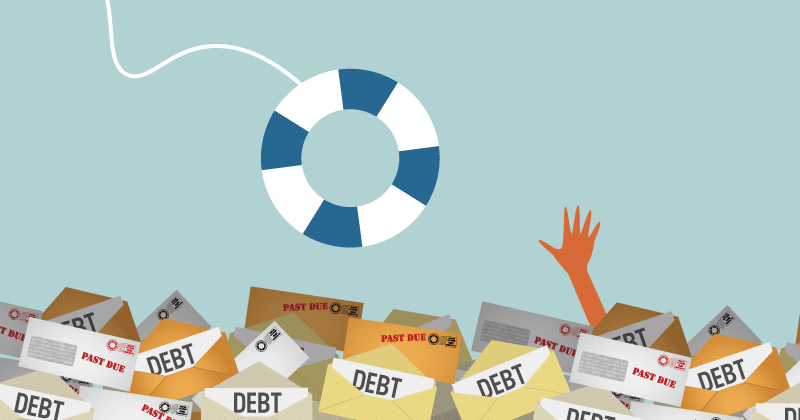
When your debts are rising it’s easy to fall into a spiral from which you feel there’s no escape. More debt leads to additional interest accruing which only means you fall more into debt. It’s a vicious cycle and can be completely overwhelming.
If you’re suffering from the crush of mounting debt it’s important to take action to improve your situation immediately. The longer you wait the deeper the debt becomes and the harder it will be to rectify the situation.
Assess Your Debts
Before you can develop a plan to fix your mounting debt you need to get a handle on exactly what debts you are carrying. Only when you have compiled a complete list of all your debts with as much detail as you have about the size, interest rates and payment amounts can you properly plan out a way to begin eroding them.
Watch Out For Fees
One of the biggest escalators with debt is the assessment of fees for missed or late payments. Check the status of all of your debt accounts and make note of which will charge you fees and prioritize making at least your minimum payments every month on those accounts. Taking on late fees will rapidly escalate your debt at a significantly higher rate than just the interest alone.
Work With Your Creditors
Your lenders don’t want you to default on their loans because then they only receive a fraction of the money they are owed by selling off to a collection agency. If you are experiencing short term money problems or going through a career change where you can no longer handle all of your obligations, reach out to your creditors and inquire about payment plans which will make your credit management more feasible. Often this can mean lowering your monthly minimum payments or even coming to an agreement to forgive a portion of your debt in exchange for a payment plan which still nets more money than selling your debt would.
Prioritize Your Debts
Not all loans or credit cards are created equal. When you have accounts with varying interest rates it’s important to know which ones are costing you more every month. When all else is equal, if you have money to send to one of your debts you are likely better off paying down the creditor with the highest interest rates so that your debt goes up by as little as possible when the interest compounds.
Set a Budget
Your assessment of all your debts can be combined with a list of other obligations like rent, insurance and basic living costs. From there you can determine how much of your money you need every week to make your minimums, and use that information to set a budget. If possible, plan your budget to allow for paying more than your minimums in order to begin the process of paying down your debt faster.
Consider Bankruptcy
When you’ve tried the above options but still find that you can not get ahead of your debt it may be time to consider bankruptcy. This Michigan bankruptcy lawyer offers free chapter 7 consultations where you can sit down with an attorney who specializes in bankruptcy law and lay out your situation. An attorney can let you know if there are better options for paying off your debts or if filing for chapter 7 bankruptcy will be your best route.
Remember, all is not lost if you do have to declare bankruptcy. While a bankruptcy will impact your credit for years, there are ways to recover. Once all the dust has settled from your bankruptcy and you feel like you are once again able to make payments, consider taking on a reasonable monthly payment to help you prove you are creditworthy and rebuild your credit. Services such as the one offered by Day One Credit can help you find financial products like fresh start auto loans to get back on your feet.
If your loan and credit card debts feel like too much and you find that the majority of your time and resources are spent on just trying to keep from falling behind it’s time to tackle your debt head-on. Whatever route proves most successful for you, what’s important is putting yourself on a path to a life free from the burden of ever-rising debt levels.
This is an article provided by our partners network. It might not necessarily reflect the views or opinions of our editorial team and management.
Contributed content

Founder Dinis Guarda
IntelligentHQ Your New Business Network.
IntelligentHQ is a Business network and an expert source for finance, capital markets and intelligence for thousands of global business professionals, startups, and companies.
We exist at the point of intersection between technology, social media, finance and innovation.
IntelligentHQ leverages innovation and scale of social digital technology, analytics, news, and distribution to create an unparalleled, full digital medium and social business networks spectrum.
IntelligentHQ is working hard, to become a trusted, and indispensable source of business news and analytics, within financial services and its associated supply chains and ecosystems









